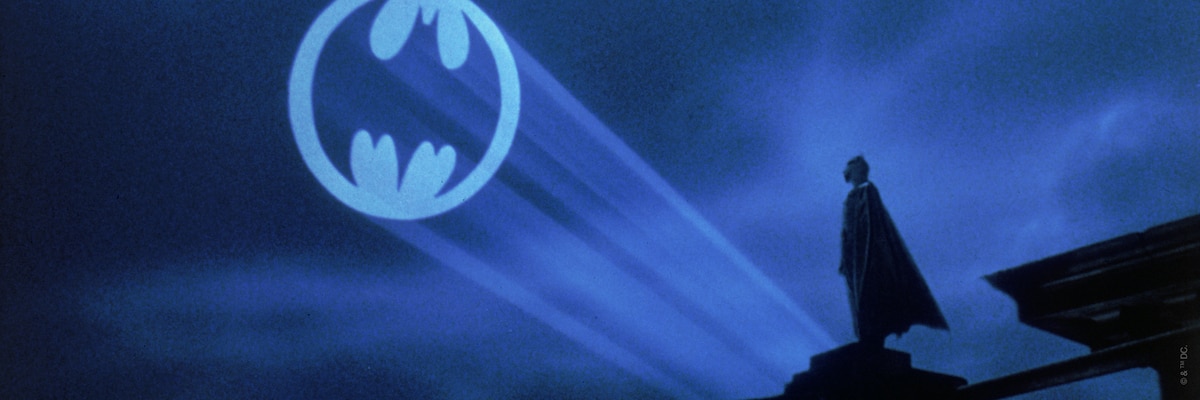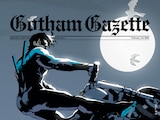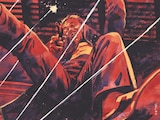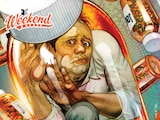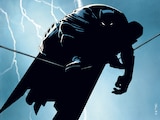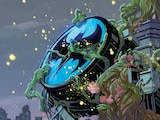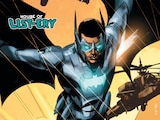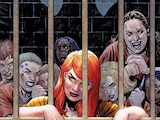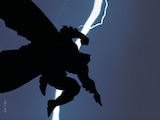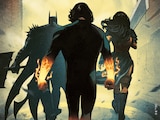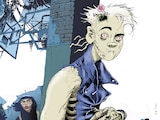Following up on the success of last year’s Batman: Resurrection, author John Jackson Miller has returned with Batman: Revolution, an all-new adventure set in the world of Tim Burton’s Batman films.
This time, the Dark Knight matches wits with none other than The Riddler, a brilliant—but unknown—copy boy and puzzle creator at the Gotham Globe who’s tired of constantly living in the Batman’s shadow. Available as a hardcover, e-book and audiobook, Batman: Revolution will be released worldwide on October 21. However, you don’t have to wait until then for your first taste of this new Burtonverse adventure. Read on for an excerpt in which we meet Batman’s new adversary for the first time.
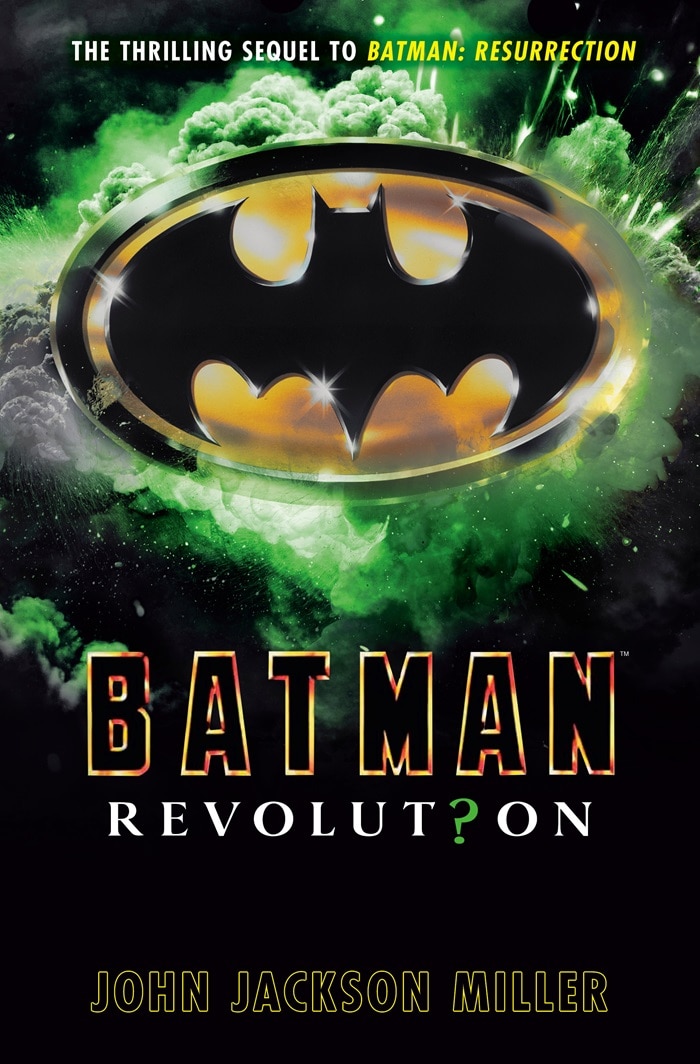
An excerpt from the prologue of Batman: Revolution, in which we meet a young Norman Pinkus on a memorable day for Gotham City. Destined to become The Riddler, Norman’s young life was anything but ordinary...
The gangly kid followed his mother from the atrium of the library into the periodicals room, the drafty hall where yesterday’s newspapers hung from wooden spines. He set down the two new arrivals he had collected that he didn’t read—both foreign-language publications. Oh, he’d try to read them, later; pictures told you a lot. But he only had so much time in the mornings. He folded the others and tucked them under his arm.
Martina fretted. “It’s not my job to bring the papers in. Or to shelve books, or fix the card catalog. Or anything else you do, Norman. Mister Banion is going to think there are elves working here at night!”
“Just call me The Library Elf.”
“You were The Bookworm yesterday.” She tugged his collar. “Time for breakfast.”
He followed her out of the periodicals room and through a door marked “PRIVATE.” They descended a nearby flight of stairs. She led him into the darkened employees’ breakroom, where she drew a glass bottle of milk and some oranges from a refrigerator. From there it was down yet another shadowy staircase. Built in the heart of Gotham City’s historic Printers District, the main library sat above a warren of basements and sub-basements—places Martina had told her son never to explore. He’d always complied. There were more than enough adventures above to satisfy him.
She arrived at their hideaway, a forgotten storage room where she’d set up a makeshift apartment. Their “kitchen table” was a discarded card catalog cabinet; high-rise stools sat on either side. Jigsaw puzzles that had been removed from the senior lounges upstairs for being too difficult sat completed in a stack on a spare door sitting atop two filing cabinets. Every time Norman and his mother completed a picture, they started a new layer above it.
And everywhere sat books. Piles of volumes withdrawn from the collection for being too old or damaged; Norman had claimed them for his own. It was nice to own something. Of course, he also thought he owned all the ones upstairs, too.
Under the light of a single bulb, his mother parceled out cold cereal. She yanked away the newspapers. “No reading until you eat. It’s a school day.”
Norman nodded and dug in.
She gestured to his makeshift bed, a bedroll spread across crates. It was undisturbed. “I found you asleep in the stacks again last night. You keep reading after dark and you’ll need glasses soon.”
“Where’d I wind up?”
“Seven ninety-one.”
“Entertainer biography!” Norman spent a lot of time in that section. They couldn’t afford a television, but he still enjoyed reading about stars.
And every so often, he’d see his father’s name.
Norman had never actually spoken to his father, but Martina had made the man real—and larger than life. Philmont Pinkus had written for films, the kind they played at theatres like the Monarch. Serious pictures that warned against the bad people who were threatening the world. One book Norman had found even suggested his father’s patriotic movies helped pave the way for the United States’ entry into the Second World War.
But a couple of years after peace returned, people must have decided they didn’t like him for some reason. Norman hadn’t been able to find his father’s name in any books or magazines published after the war. Indeed, he hadn’t seen him since he was a baby.
His mother had always told Norman his father was away on an endless series of location shoots, and that he was sending checks— but the kid could tell whatever was coming in wasn’t enough. Single motherhood in Gotham City was rough when you didn’t know anyone. Martina had taken a series of ever-more degrading jobs. While Norman went to school, she shuttled between a typewriter factory and a half dozen rich people’s houses, sleeping on the bus in between. And then Norman came home to the library, hiding until the last staffers left. The heat barely worked in the cavernous building, but at least it was dry—and safe.
They had lived in the library for five years, so far. For his mother, it was a last-ditch solution to a desperate situation. For Norman, it was like living in heaven.
So long as no one ever found out.
His mother pulled a note from her pocket. “I had a couple of pieces of news of my own for you last night, but you vanished before I could tell you.”
Interest piqued, Norman answered as he often did. “Riddle me!”
She thought for a moment. “A crook flees like a cat. What do fleas like?”
“That’s too easy. A dog.” His mouth dropped open. “Wait. Did I find an animal for real? Which one?”
“Let me see.” She put on the reading glasses she had recently started needing and read her note. “The Pomeranian. The owner said it was his dog, all right. Binky is back home.”
The right dog! Norman beamed.
Several days earlier, he’d seen an ad in the Gazette from someone who’d lost their beloved pup in Burnside. The day after, the Daily Gotham had an ad from someone who’d found a dog matching the description—and both their phone numbers were part of the SHoretown-4 exchange, a code that put them in the same neighborhood. The information was all there to make the connection—but only someone who closely read both newspapers would find it.
And who got all the newspapers, much less read them front-to-back?
Norman did—and he remembered something. “Ma, the ad said there was a reward for finding Binky.”
“I expect they worked that out.”
“No, I meant for me. For finding him.” Norman looked expectantly across the bowl.
Martina pursed her lips. “The woman who placed the ad found the dog, not you.”
“Yeah, but I made the connection!”
She pushed down her glasses and stared over them at him. “Norman, is that why you helped these people? For the money?”
“No, I—”
“You’re saying if there was no reward, you’d never have helped. Because that’s what you care about.”
“But we could use the money!”
“We don’t have a mailing address, Norman.”
“We have a post-office box—”
“Which I haven’t checked in months. You know why.”
He did. His mother had found visiting the box dispiriting; it was always stuffed with notices regarding her husband’s unpaid bills from years before. On her last visit, a collection agent had tried to ambush her. She had never gone back.
He muttered. “Just get a different box. They’re free.”
She scolded him. “We’re allowed one. You don’t take advantage!”
Norman’s head drooped over his bowl. The life had gone out of him.
She patted his tousled hair and spoke in soothing tones. “What does Matthew 6:1 say?”
“ ‘I’m pretty tall for junior varsity’?”
“Norman!”
He looked up and flashed a roguish smile, glad to have gotten her. But then he said what she wanted to hear. “I shouldn’t do good deeds where others can see them or I’ll have no reward from my Heavenly Father.”
“And you know what the meek shall inherit.” She took the dishes and showed him the time on her wristwatch. “If you don’t want to inherit detention, you’d better get going.”
Norman nodded. There wasn’t enough time to get through all the papers before making his way to the bus stop, but he could surely get through the first sections. It was always interesting how the various newspapers chose different stories every day. It really took a major event for all of them to—
Norman’s eyes widened. The Globe’s headline read:
THOMAS WAYNE MURDERED
ONLY CHILD SURVIVES!
“ ‘Prominent doctor and wife slain in robbery,’ ” Norman read, the words catching in his throat.
Martina put down the plates. She rarely was interested in the papers, but this time she joined him. Her mouth opened in horror. “ ‘Unidentified gunman leaves only child unharmed!’ ”
Norman’s eyes fell on the halftone image of a young boy in a cap, looking toward the photographer—and all of Gotham City—from around the coat of a policeman whose face was out of the frame. Behind them, other officers worked the crime scene.
Martina covered her mouth as she lifted the paper. “I applied to work for the Waynes. They already had someone.”
Norman looked at the other papers in the stack one by one. Every newspaper the library received led with the same story. Different headlines, of course; even a reader as young as Norman understood the different styles of each. But they were uniform in conveying the importance of the news. The sensationalist Daily Gotham screamed about the murders in hundred-point type; the stodgy News-American broke from its routine format. Even the radical Gotham Liberator, in which Norman had never seen a nice word about a millionaire, had hurried an extra edition to press.
And they all had a variation of the photo. The same horrible, sad scene of the child at the street corner of Pearl and Phillips. Norman sat transfixed. “Why would someone kill those people?”
“For money—or meanness,” Martina said. “But probably money. You see where greed gets you?”
He didn’t blink. “I have a cap like that,” Norman mumbled.
We’re the same age.
Martina read more aloud as he stared. The child had reported a smiling gunman, along with a second assailant who had not fired the fatal shots. The police, as yet, had nothing. “ ‘An officer named Gordon has reached out to the public for any information,’ ” she read.
Norman whispered a response. “Someone should help him.”
Batman: Revolution by John Jackson Miller is available in bookstores, libraries and digital retailers on October 21, 2025.
